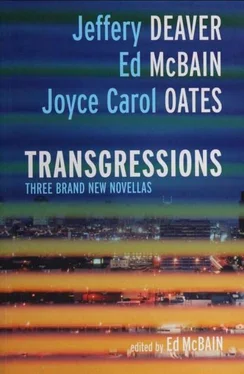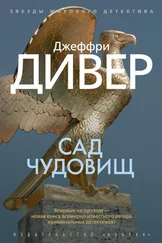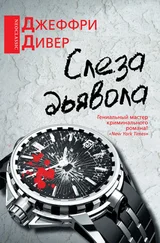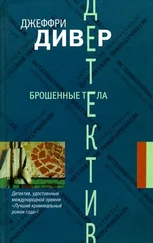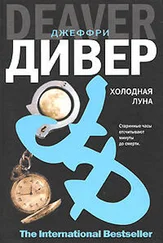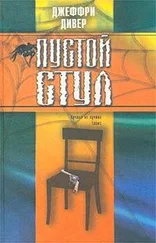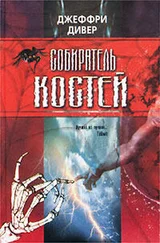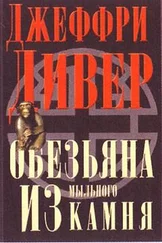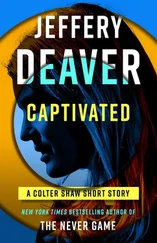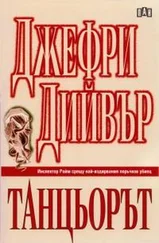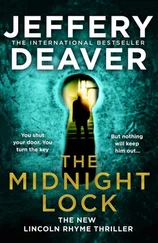You’re the best at what you do, statistician. Man, that’s a hard job...
“Okay,” LaTour said. “I’ll check out the wills and the insurance policies. Gimme the name of the icees.”
“The?—”
“The corpses, the stiffs... the losers who killed ’emselves, Tal. And their lawyers.”
Tal wrote down the information and handed the neat note to LaTour, who stuffed it into his plaid shirt pocket behind two large cigars. He ripped open a desk drawer and took out a big, chrome automatic pistol.
Tal asked, “What should I do?”
“Get a P-I–I team and—”
“A what?”
“You go to the same academy as me, Tal? Post-Incident Interviewing team,” he said as if he was talking to a three-year-old. “Use my name and Doherty’ll put one together for you. Have ’em talk to all the neighbors around the Bensons’ and the Whitleys’ houses. See if they saw anybody around just before or after the TOD. Oh, that’s—”
“Time of death.”
LaTour gave him a thumbs up. “We’ll talk this afternoon. I’ll see you back here, how’s four?”
“Sure. Oh, and maybe we should find out what kind of car the Whitleys’ daughter drove. See if the wheelbase data match.”
“That’s good thinking, Tal,” he said, looking honestly impressed. Grabbing some boxes of 9mm cartridges, LaTour walked heavily out of the Detective Division.
Tal returned to his desk and arranged for the P-I–I team. Then he called DMV, requesting information on Sandra Whitley’s car. He glanced at his watch. One P.M. He realized he was hungry; he’d missed his regular lunch with his buddies from the university. He walked down to the small canteen on the second floor, bought a cheese sandwich and a diet soda and returned to his desk. As he ate he continued to pore over the pages of the crime scene report and the documents and other evidence he himself had collected at the house.
Shellee walked past his office, then stopped fast and returned. She stared at him then barked a laugh.
“What?” he asked.
“This is too weird, you eating at your desk.”
Hadn’t he ever done that? he wondered. He asked her.
“No. Not once. Ever... And here you are, going to crime scenes, cluttering up your desk... Listen, Boss, on your way home?”
“Yes?”
“Watch out for flying pigs. The sky’s gotta be full of ’em today.”
“Hi,” Tal said to the receptionist.
Offering her a big smile. Why not? She had sultry, doe eyes, a heart-shaped face and the slim, athletic figure of a Riverdance performer.
Margaret Ludlum — according to the name plate — glanced up and cocked a pale, red eyebrow. “Yes?”
“It’s Maggie, right?”
“Can I help you?” she asked in a polite but detached tone. Tal offered a second assault of a smile then displayed his badge and ID, which resulted in a cautious frown on her freckled face.
“I’m here to see Dr. Sheldon.” This was Sam Whitley’s cardiologist, whose card he’d found in the couple’s bedroom last night.
“It’s...” She squinted at the ID card.
“Detective Simms.”
“Sure. Just hold on. Do you have—”
“No. An appointment? No. But I need to talk to him. It’s important. About a patient. A former patient. Sam Whitley.”
She nodded knowingly and gave a slight wince. Word of the deaths would have spread fast, he assumed.
“Hold on, please.”
She made a call and a few minutes later a balding man in his fifties stepped out into the waiting room and greeted him. Dr. Anthony Sheldon led Tal back into a large office, whose walls were filled with dozens of diplomas and citations. The office was large and beautifully decorated, as one would expect for a man who probably made a few thousand dollars an hour.
Gesturing for Tal to sit across the desk, Sheldon dropped into his own high-backed chair.
“We’re looking into their deaths,” Tal said. “I’d like to ask you a few questions if I could.”
“Yeah, sure. Anything I can do. It was... I mean, we heard it was a suicide, is that right?”
“It appeared to be. We just have a few unanswered questions. How long had you treated them?”
“Well, first, not them. Only Sam Whitley. He’d been referred to me by his personal GP.”
“That’s Ronald Weinstein,” Tal said. Another nugget from the boxes of evidence that’d kept him up until three A.M. “I just spoke to him.”
Tal had learned a few facts from the doctor, though nothing particularly helpful, except that Weinstein had not prescribed Luminux to either of the Whitleys, nor had he ever met the Bensons. Tal continued to Sheldon, “How serious was Sam’s cardiac condition?”
“Fairly serious. Hold on — let me make sure I don’t misstate anything.”
Sheldon pressed a buzzer on his phone.
“Yes, Doctor?”
“Margaret, bring me the Whitley file, please.”
So, not Maggie.
“Right away.”
A moment later the woman walked briskly into the room, coolly ignoring Tal.
He decided that he liked the Celtic dancer part. He liked “Margaret” better than “Maggie.”
The tough-as-nails part gave him some pause.
“Thanks.”
Sheldon looked over the file. “His heart was only working at about fifty per cent efficiency. He should’ve had a transplant but wasn’t a good candidate for one. We were going to replace valves and several major vessels.”
“Would he have survived?”
“You mean the procedures? Or afterward?”
“Both.”
“The odds weren’t good for either. The surgeries themselves were the riskiest. Sam wasn’t a young man and he had severe deterioration in his blood vessels. If he’d survived that, he’d have a fifty-fifty chance for six months. After that, the odds would’ve improved somewhat.”
“So it wasn’t hopeless.”
“Not necessarily. But, like I told him, there was also a very good chance that even if he survived he’d be bedridden for the rest of his life.”
Tal said, “So you weren’t surprised to hear that he’d killed himself?”
“Well, I’m a doctor. Suicide doesn’t make sense to most of us. But he was facing a very risky procedure and a difficult, painful recovery with an uncertain outcome. When I heard that he’d died, naturally I was troubled, and guilty too — thinking maybe I didn’t explain things properly to him. But I have to say that I wasn’t utterly shocked.”
“Did you know his wife?”
“She came to most of his appointments.”
“But she was in good health?”
“I don’t know. But she seemed healthy.”
“They were close?”
“Oh, very devoted to each other.”
Tal looked up. “Doctor, what’s Luminux?”
“Luminux? A combination antidepressant, pain-killer and antianxiety medication. I’m not too familiar with it.”
“Then you didn’t prescribe it to Sam or his wife?”
“No — and I’d never prescribe anything to a spouse of a patient unless she was a patient of mine too. Why?”
“They both had unusually high levels of the drug in their bloodstreams when they died.”
“Both of them?”
“Right.”
Dr. Sheldon shook his head. “That’s odd... Was that the cause of death?”
“No, it was carbon monoxide.”
“Oh. Their car?”
“In the garage, right.”
The doctor shook his head. “Better way to go than some, I suppose. But still...”
Another look at the notes he’d made from his investigation. “At their house I found an insurance form for the Cardiac Support Center here at the hospital. What’s that?”
“I suggested he and Liz see someone there. They work with terminal and high-risk patients, transplant candidates. Counseling and therapy mostly.”
Читать дальше
